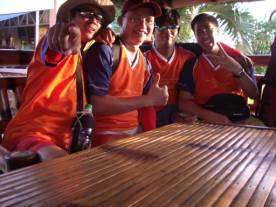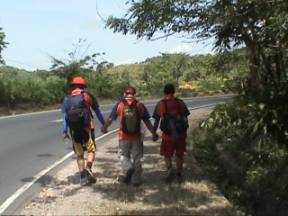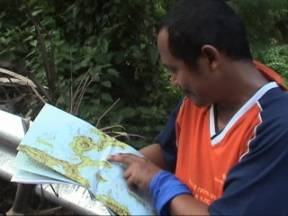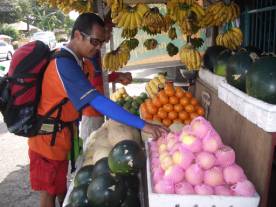|
News & Features |
|
Your Free Bicolnews Online!
|
|
|
|
First posted 11:56pm (Mla time) April 17,
2006 By Delfin Mallari Jr. Inquirer Editor's Note: Published on Page A17 of the
April 18, 2006 issue of the Philippine Daily Inquirer LUCENA CITY - They have been buddies since
high school at the Ateneo de Naga University two decades ago. But instead of holding a Holy Week reunion
in their favorite pub and reminiscing about those rambunctious days amid
endless mugs of beer, the four embarked on a long hike from Calamba City
to the city of their roots, Naga -a 450-km stretch of the Maharlika and
Quirino highways - to deliver a strong message for peace and the
environment. "We believe that the rape of nature is
also the cause of raging conflict in our midst. In this sense, peace and
environment are two related issues," said Edgar Ramores,
spokesperson of the group. "The rape of nature and our natural
resources is not only the cause of man-made calamities that have ravaged
us but also the cause of poverty, dislocation and other social
ills," he said in an e-mailed statement to the Inquirer.
The highway trekkers and members of Ateneo
de Naga's High School Class 1987 are Ramores, who has a steel
fabrication and aluminum glass business; Michael Cuesta, a researcher at
the Social Science Research Center-Ateneo de Naga; Al Calara, a banker;
and Quintin Barachina, a telephone company employee. Calara and Barachina are members of the
United Trekkers Club. Ramores
and Cuesta are based in Naga, while the other two have settled in
Manila. "We are brothers in several
organizations. Magkukumpare.
We are one in many things, including the environment and social
issues," Ramores described the group. Preparation They started preparing for the hike only in
February, exchanging information through the Internet and mobile phone
text messages. They walked 3-5 km a day, while two of them had climbed
two mountains in Cavite. "The thought of just basking in the
friendship helped us prepare mentally," Ramores said.
On April 8, the group hit the road at
Turbina at 4 a.m. "There was no departure ritual, just a general
orientation of do's and don'ts. No send-off party. No back-up vehicles.
But we did have a monitoring team checking on us at a particular
time," Ramores said. Sporting colorful gears, jungle hats and
shades, the hikers took the left side of the road for safety. In their
backpacks were mist spray, sun blocks, two-way radios, mobile phones,
digital still and video cameras, dry-fit shirts, and a map. Their shirts read: "When it rains, our
tears pour. Save our forests." Quitting The punishing task was expected to bring
great discomfort. "Aching toes, soles, feet, thighs, legs, backs,
shoulders; source of water, and the heat! Too much heat!" Ramores
said in an e-mail. A day after embarking on the journey along
asphalt and concrete roads, where speeding vehicles posed real danger,
two of them thought of quitting. "It was drowned out by the outpour of
support. We received text messages and phone calls daily from friends,
family, and people we don't know personally?all expressing support in
our walk. It was very inspiring," said Ramores. "There was no backing out. We already
made it this far," he said as the group spent the night in Gumaca
town in Quezon. Ritual Every morning, they would wake up early and
take a quick bath. "We teased each other and traded jokes. We
reviewed and revised plan, stops and maps," Ramores said. "We walked in [twos]. We did a lot of
pictorials. We smelled the flowers, sang in a makeshift videoke bar,
exchanged banter or struck a conversation with roadside storekeepers and
played with grass." Roadside
eateries offered heavy meals that included rice, vegetables and fish.
"We started our walk before sunrise,
and rested before sunset (for security reasons). We didn't encounter
rain. But our decision was to walk, come rain or shine," he said. In Lucena City and Gumaca, the group rested
in a hotel. In Tagkawayan and Sipocot, friends offered shelter for the
night. Sponsors Serving as sponsors of the Holy Week trek
were friends, mountaineers, the Kaiba News and Features, and De Naga
Pawnshop. Ramores said he thought of his family with
every step. To kill boredom, he picked up assorted items along the
route?battered coins, packs of cigarettes, a hat, stainless screw knot
and marbles. "After we reach the finish line, I
want to go home, kiss my wife and children, and eat lots of fruits and
fish. We will have a reunion with other friends later," he said. Finally, they arrived in Naga at around 7
p.m. on Wednesday and were welcomed by families and friends. "Our firm belief in our advocacies is
our motivation. We can do
something as grueling for what we believe in. We want to
encourage/challenge others to do something in their own ways,"
Ramores stressed. Social message In a statement, they explained that as they
tried hard to reach their goal, they also intended to draw inspiration
from their actual encounters with different places and people as
subjects of future literary pieces. Good literary work develops through time
and should have a real brush with reality in so far as one intends it to
be realistic and scientific, Ramores said. "The walk has in mind a compilation of
literary works as output. All forms may be used, such as poem, essay,
short story (including children's), song, tigsik and novel," Cuesta
said, adding: "Although literary work particularly refers to
written form, we do not exclude other artistic and cultural expressions
such as painting, photography, and the like." Barachina explained that they were not
fanatic writers.
"We are not romancing the road. We
would walk just enough to be inspired and we would leave half of our
energy to reflect, discuss and write," he said. "During the
day, we were like laboratory scientists observing our specimens,
experimenting and come night time, we would write our observation
report." "We are not professional writers, just
walkers trying to write some sense - some social sense," Ramores said. For any query or further information,
please contact 0919-300-3612. Click here to view the photos of our journey: http://pg.photos.yahoo.com/ph/alcalara/album?.dir=/561cscd&.view=t
Related Stories: A Long Walk for Peace and Environment
Interview
with the Walkers for Peace _____________________________________________________
If you have articles, press
releases and bicol news that you would want to contribute to
KAIBA, send them to us in a text format at pmcalara@gmail.com. Articles must be pasted or typed directly into
the email. No attachments please. |
|
From Activists viewpoint |
Plant a tree today! |
|
The right libraryonline for law students |
|
KAIBA News & Features, Copyright © 1999. All rights reserved. Revised: April 25, 2007 06:52 AM |
|||



